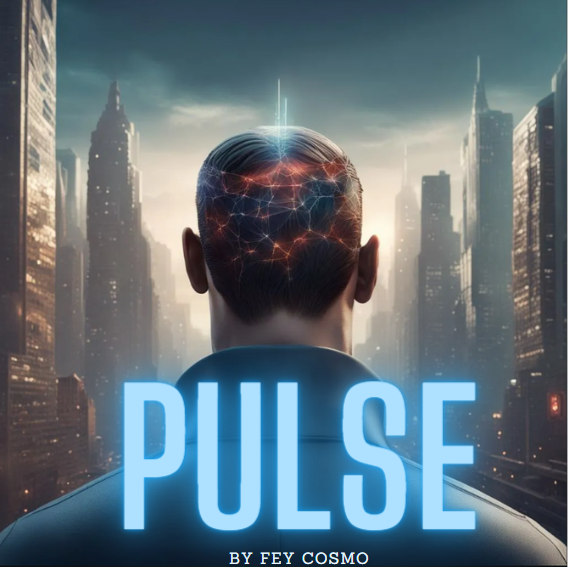Lovingly dedicated to the real Brett
When the first flesh-to-fibre implant was going to be released for the public, my darling Brett was one of the hundreds who slept on the street to be at the front of the queue. As a healthy 35-year-old with an interest in computers and a love of new tech, he was the perfect test subject to see how effective this new form of browsing and gaming could be. If he’d had a fuller head of hair and less crooked teeth, he could have been one of the poster boys, he was THAT enthusiastic about it.
The media was as frenzied as sharks with chum: this was the breakthrough of the decade and was touted as the start of the new age of ‘smooth computing’. There had been opposition from various church groups, of course, but ultimately the desire to not just USE the computer, but BE it, was too strong. Since the first neural implants became accessible for medicine, the lawyers had foreseen a time when they would have to defend the right to choose an implant when it wasn’t strictly needed and had been quietly preparing in the background. It was about the freedom to choose what you want for your body- and allegedly, nothing to do with the fortune to be made.
The implant didn’t just make it possible to browse the internet without a device, it also allowed for a totally seamless integration of the conscious thoughts and a personal, impregnable computer. The line between artificial intelligence and its users had been blurred for many years, but this device, the Verstand model 4, destroyed the line all together. Through a six-hour operation, the implant would be connected into the occipital lobe with delicate fibre optic nodes coated in an artificial myelin sheath grown from the body’s own proteins and fats. Any thoughts or sights you wanted recalled forever could be captured with flawless clarity. The users were told to imagine being able to watch content projected as an overlay of their own vision or being able to stream an entire day of adventuring, hands-free. Many of the people in the line wanted the Verstand4 purely for the promise of recording every moment. Not Brett. He couldn’t wait to play computer games without controllers, as the implant promised.
For many years, the German company that made the Verstand was the world leader in prosthetics, so when the prototype for Verstand1 was tested and it returned all the functions to the stroke users it was tested on, the leap from spinal cord to the brain was an easy one. They took a financial hit when Verstand2 was too closely positioned to the amygdala and gave the subjects regular panic attacks. Naturally, Verstand3 was moved and refined and finally upgraded enough that Verstand4 was deemed commercially and medically viable for users who met the criteria.
He sold his vintage car and put down the deposit for the implant the day he was given clearance to have the surgery. My sweet Brett, all he wanted was to run around a version of ancient Greece, slaying digital monsters.
To even be able to stand in the line there was a whole process. The testing was arduous, and to me, cruel. Users were not permitted to have any form of previous mental health condition that could tarnish the interaction of the implant with the brain. Some very important celebrities were declined clearance on mental health grounds, so there were lawsuits filed for discrimination. Ironically, when Brett had his accident, they were still tied up in the courts. Users couldn’t be colour-blind, be on the autism spectrum or even have any limbs missing, for fear that the implant would not know what to do with phantom limb impulses. Candidates also needed a relatively high IQ because it was honestly believed that the stupid bell curve of “human intelligence” could determine if a person would know the difference between reality and what the implant was showing. We had an argument over this during the application process and I remember how I made a big deal out of moving his pillows to make him sleep on the couch. It boiled my blood to think the implant would ONLY help a limited number of very lucky people- not those who would really benefit from the assistive aspects. Brett had sneered that I was jealous because my depression excluded me from even applying. He walked out after saying that, realising he’d gone too far.
I lay in our bed, boiling with rage that night. I was still a full-time teacher and had met many students who would do wonders if they were allowed more access to this particular technology. I didn’t see the Verstand as a blessing then, and I certainly don’t now, but at the time I was up on my high horse about how they should not be thinking about how to help the elite applicants have even MORE benefits that regular people couldn’t access. All I saw was how the technology would have helped those who really needed it. I left early the next morning after the fight and went straight to see dad.
Harrington Gardens was only five minutes away, but it still felt like driving to another country. It was such a carefully regimented, moderated environment that it didn’t feel like a care facility; it was run like a prison for those who dared to age with money. Dad was in his room, which was set up almost identically like home had been. The goal was to ease the transition, but it was still little more than a childcare centre for the elderly. There were photos of mum and me everywhere in case Dad thought she was alive again, or maybe to remind him that I was nearby and didn’t visit nearly enough. He was having a sharper day than he normally did and greeted me warmly as I put my hand on his.
“That magpie I like to watch hasn’t come to the tree yet,” he said, staring past me at his window.
“How’s the knee, dad? Are you warm enough?”
“I want to do something about the weeds: you can’t get the help, you know, no one wants to work anymore.”
“Are you hungry, dad? Do you want a cup of tea?”
“He hasn’t come yet. He likes to sit right there where I can see him, and he’s got good eyes.”
“Dad, I had a fight with Brett.”
“I left the remote control somewhere, see if you can find it for me, will you…”
There was no point of course. I could have been any carer or nurse, or even the cleaning lady, the conversation would be the same. And if I’d shown up in the evening, I had no idea what side of him would come out. He would be confused, that much was certain, but it could be about anything, and he might not even speak to me. I kissed his forehead and left to cry quietly in the car.
I apologised, of course I did. It was silly, we’d already sunk thousands of dollars into his application, medical testing and all the other legal requirements. Thanks to our collective efforts, my precious Brett was on the short list by that stage. He could practically smell his spot in the line with the other frantic fans. He would be with the others- all the tech influencers, posers, and people with too much money who simply HAD to have something that so few people had access to. Brett was not like them: he was a regular, wonderful man who just wanted to play whatever version of his favourite city builder game was available. Making whole new places rise out of the ground like the conductor of a gaming orchestra, waving his hands as if he was there in person: the unquestioned God of Brett town, with the fate of thousands of digital dots at his fingertips. Despite all my boring, high-minded rhetoric and moral objections on the matter, I adored his child-like, innocent desire to play.
The irony of the events to follow did not escape me.
He had a month of joy where I barely saw him, because he was playing and browsing so much. All the leave from work that he had available to him was given over, so he could fully immerse himself in every function Verstand4 could provide for him. At first, he was diligent about trying everything, but eventually it was just games, games, games. He’d always been very fond of simulators, and he went head-first into them like never before. A couple of times I had to remind him to sleep, eat and bathe. With the excitement of a child coming home from the first day of school, he talked to me about the amazing possibilities for me as a teacher. Imagine all that I could learn! But I remained “his little luddite” and kept the experience at arm’s length. I still loved his company, but it was hard to compete with the entirety of the internet, his new mistress. Yes, I was THAT petty. But I missed when his attention was shared between us more equally.
My bitterness, now, feels like a permanent rotten taste in my mouth after the Pulse.
I no longer teach history or literature, because I am a part of it, and it’s interesting that I mentioned my jealousy, as the terrorists have come out and expressed the same thing as a sort of excuse for what happened. They wanted what they couldn’t have, pure and simple. It was more damaging than gluing themselves to the road outside the headquarters or padlocking themselves to trucks carrying parts. It was misguided activism, yes, but a part of them simply coveted the experience of the lucky users. Those who orchestrated the Pulse were not just impatient to experience Verstand4: they were angry it wasn’t available for everyone. I understand because I thought similar things.
My beautiful Brett was nearing the end of his leave time and was using Verstand4 to find us a place to visit for our anniversary. It was a big deal to us, we’d made it ten years after my own sister had given us a year, tops. He wanted us to revisit the small island we’d honeymooned on and was exploring the facilities that morning. At least one of his last, cogent thoughts was of how gorgeous it would be to snorkel through the water and lie on the warm sand dunes as the sun went down. He was telling me we’d both need new bathing suits when he suddenly fell over.
I didn’t understand it at the time, but the activists, who were really terrorists, had broken into the headquarters where Verstand4 was manufactured and specifically targeted the server where the users were encouraged to store their memories. They were backed up, but it needed just one blue screen of death for all the users to simultaneously lose access to it. My sweet Brett had once joked that he might freeze up and must be reset. He had laughed and said, “You’d have to find a way to turn me off and on again.” I had poked him in the belly and chased him around saying, “reset”, before we’d collapsed onto the couch and made warm, laughing love. That was a mere week before he had the implant installed, but now that he HAD blue-screened, it was no longer a joke.
I’d seen seizures before, of course I had. I also knew CPR, which is how I kept him alive until the ambulance came. But I couldn’t stop parts of his brain dying, the delicate synapses were instantly and totally deprived of oxygen rich blood by the implant setting fire to his mind. The carefully engineered cerebrospinal fluid conducted the pulse throughout the brain: a bolt of lightning burning through every axon that it could reach. He twitched horribly and moaned, contorting his limbs as if grasping the air for help. His mouth opened all wrong, to the side, and his eye drooped like he couldn’t hold himself up. He tried to say my name, I know he did, but he no longer controlled his own tongue. His crotch thrusted sharply, and I saw a pool of urine appear on his trousers as his leg kicked randomly. I tried to hold his hands and stabilise his movements, but his fingers became misshapen claws I no longer recognised.
I only left for a moment to ring the ambulance in a half screaming, half crying voice and that’s when his heart stopped. I said though, that I knew CPR, so I used it. First time ever I had to use it, but I was glad for my mandatory training then, because it saved him. We’re now world famous, because only three people survived the Pulse attack, and my amazingly tough Brett was the oldest one.
It was international news within minutes and the internet damn near exploded with conspiracy theories and misinformation. Was it a malfunction or a coordinated attack, how could this happen, blah blah blah. Whatever was being said never reached me until months after, because those first two weeks were only about keeping my dear Brett from dying. The doctors outdid themselves trying to help and blessedly, thankfully, they did not demand that I leave him alone to rest. Eventually, I was told it was a sort of digital stroke, and he had no chance of recovery. The Verstand4 had a power source and it overloaded, thanks to the terrorist’s commands. Despite that, my hand was practically fused to Brett’s, even when he slept. When he was able to drink, I was there to hold the straw. When he was able to eat, I fed him.
Selfishly, I needed to be there. I needed to see for myself in real time how much of my husband, my darling, was left to me. That is all I could think about. Whether his eyes would still sparkle when he laughed at one of my terrible puns. Whether he would remember the dates when we met, kissed, and married. Whether he’d remember how to mould his body to mine when we were intimate. My need to recapture what was left was all that drove me and all that moves me still, because I live in the hope he will return.
Verstand5 will not happen for a few years, that much I know. There are too many bugs to work out and although the consumer demand is there, the world cannot forget the faces of all of those who died and worse, the contorted, damaged faces of those who lived. The company have paid for everything Brett and the other two need, but the three survivors remain a pebble in the shoe of progress, because no one can guarantee that an attack like this will not happen again.
Where is my precious Brett now? He is in the custom-made bed the company has provided, watching a documentary about ancient Greece. He is drooling slightly, and I will be feeding him later. He cannot speak, see out of his left eye, move his limbs, or use the bathroom alone, but he is still my darling husband. Inside his damaged body, there is still the boy I fell in love with, who gazes at me now, stroking a toy figure of Hercules.




